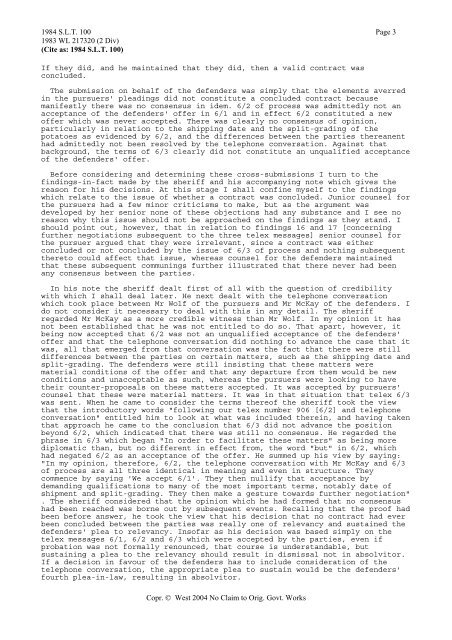Tesco v Constain - Thomson Reuters
Tesco v Constain - Thomson Reuters
Tesco v Constain - Thomson Reuters
You also want an ePaper? Increase the reach of your titles
YUMPU automatically turns print PDFs into web optimized ePapers that Google loves.
1984 S.L.T. 100 Page 31983 WL 217320 (2 Div)(Cite as: 1984 S.L.T. 100)If they did, and he maintained that they did, then a valid contract wasconcluded.The submission on behalf of the defenders was simply that the elements averredin the pursuers' pleadings did not constitute a concluded contract becausemanifestly there was no consensus in idem. 6/2 of process was admittedly not anacceptance of the defenders' offer in 6/1 and in effect 6/2 constituted a newoffer which was never accepted. There was clearly no consensus of opinion,particularly in relation to the shipping date and the split-grading of thepotatoes as evidenced by 6/2, and the differences between the parties thereanenthad admittedly not been resolved by the telephone conversation. Against thatbackground, the terms of 6/3 clearly did not constitute an unqualified acceptanceof the defenders' offer.Before considering and determining these cross-submissions I turn to thefindings-in-fact made by the sheriff and his accompanying note which gives thereason for his decisions. At this stage I shall confine myself to the findingswhich relate to the issue of whether a contract was concluded. Junior counsel forthe pursuers had a few minor criticisms to make, but as the argument wasdeveloped by her senior none of these objections had any substance and I see noreason why this issue should not be approached on the findings as they stand. Ishould point out, however, that in relation to findings 16 and 17 [concerningfurther negotiations subsequent to the three telex messages] senior counsel forthe pursuer argued that they were irrelevant, since a contract was eitherconcluded or not concluded by the issue of 6/3 of process and nothing subsequentthereto could affect that issue, whereas counsel for the defenders maintainedthat these subsequent communings further illustrated that there never had beenany consensus between the parties.In his note the sheriff dealt first of all with the question of credibilitywith which I shall deal later. He next dealt with the telephone conversationwhich took place between Mr Wolf of the pursuers and Mr McKay of the defenders. Ido not consider it necessary to deal with this in any detail. The sheriffregarded Mr McKay as a more credible witness than Mr Wolf. In my opinion it hasnot been established that he was not entitled to do so. That apart, however, itbeing now accepted that 6/2 was not an unqualified acceptance of the defenders'offer and that the telephone conversation did nothing to advance the case that itwas, all that emerged from that conversation was the fact that there were stilldifferences between the parties on certain matters, such as the shipping date andsplit-grading. The defenders were still insisting that these matters werematerial conditions of the offer and that any departure from them would be newconditions and unacceptable as such, whereas the pursuers were looking to havetheir counter-proposals on these matters accepted. It was accepted by pursuers'counsel that these were material matters. It was in that situation that telex 6/3was sent. When he came to consider the terms thereof the sheriff took the viewthat the introductory words "following our telex number 906 [6/2] and telephoneconversation" entitled him to look at what was included therein, and having takenthat approach he came to the conclusion that 6/3 did not advance the positionbeyond 6/2, which indicated that there was still no consensus. He regarded thephrase in 6/3 which began "In order to facilitate these matters" as being morediplomatic than, but no different in effect from, the word "but" in 6/2, whichhad negated 6/2 as an acceptance of the offer. He summed up his view by saying:"In my opinion, therefore, 6/2, the telephone conversation with Mr McKay and 6/3of process are all three identical in meaning and even in structure. Theycommence by saying 'We accept 6/1'. They then nullify that acceptance bydemanding qualifications to many of the most important terms, notably date ofshipment and split-grading. They then make a gesture towards further negotiation". The sheriff considered that the opinion which he had formed that no consensushad been reached was borne out by subsequent events. Recalling that the proof hadbeen before answer, he took the view that his decision that no contract had everbeen concluded between the parties was really one of relevancy and sustained thedefenders' plea to relevancy. Insofar as his decision was based simply on thetelex messages 6/1, 6/2 and 6/3 which were accepted by the parties, even ifprobation was not formally renounced, that course is understandable, butsustaining a plea to the relevancy should result in dismissal not in absolvitor.If a decision in favour of the defenders has to include consideration of thetelephone conversation, the appropriate plea to sustain would be the defenders'fourth plea-in-law, resulting in absolvitor.Copr. © West 2004 No Claim to Orig. Govt. Works
















